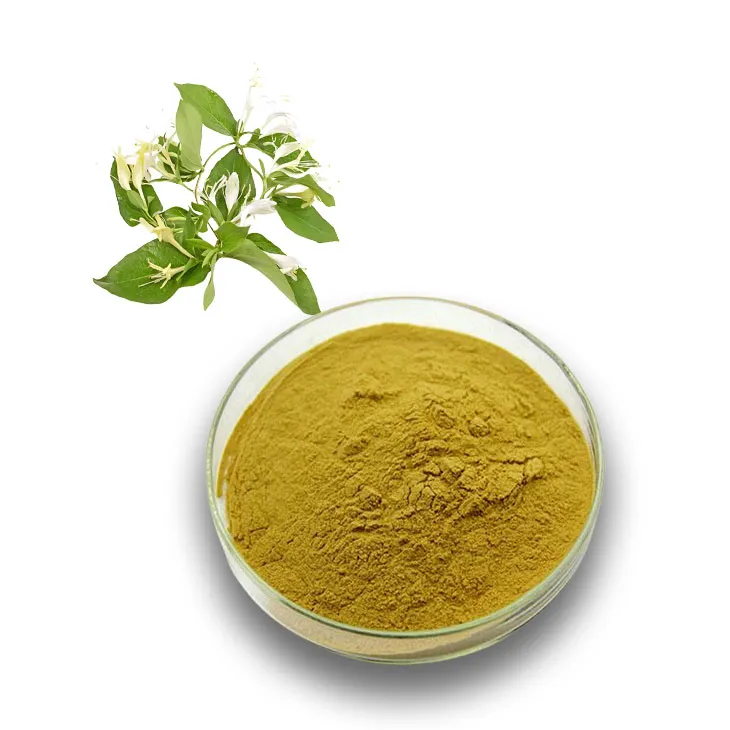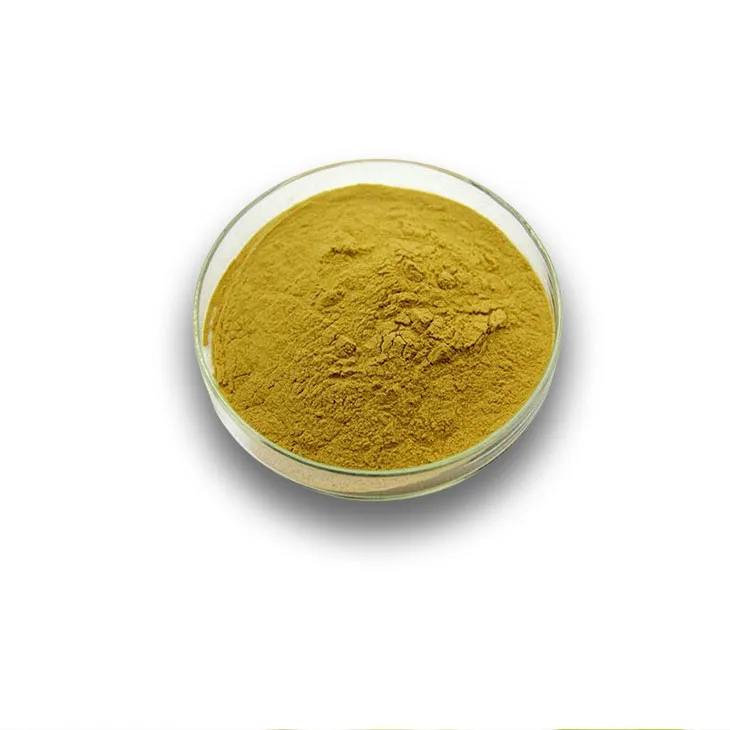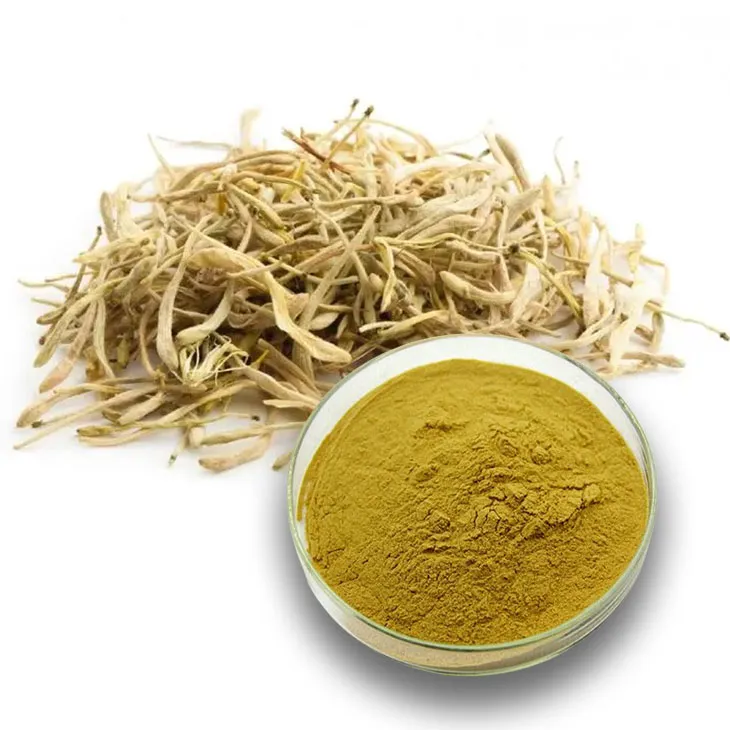- 0086-571-85302990
- sales@greenskybio.com
Certified organic honeysuckle pollen.
2024-11-30

Introduction to Honeysuckle
Honeysuckle is a well - known plant that has been an important part of herbal medicine for a very long time. It is a plant that is often associated with beauty and beneficial properties. The honeysuckle plant has various species, all of which have their own unique characteristics. In traditional medicine systems, different parts of the honeysuckle plant have been used for different purposes. For example, its flowers are sometimes used to make teas that are believed to have certain health - promoting effects.

What is Certified Organic?
When we talk about certified organic Honeysuckle Pollen, the "certified organic" label is of great significance. Certification ensures that the production process of the Honeysuckle Pollen follows strict organic standards. These standards cover multiple aspects:
- Soil Quality: The soil in which the honeysuckle plants grow must be free from synthetic fertilizers, pesticides, and other harmful chemicals. Organic farming practices are used to maintain the soil's natural fertility, such as the use of compost and natural soil amendments.
- Pollination: In the case of honeysuckle, which is pollinated by various insects, the environment needs to be conducive to natural pollination. This means that the use of artificial or harmful pollination - enhancing chemicals is prohibited.
- Harvesting and Processing: During the harvesting of Honeysuckle Pollen, only natural and non - chemical methods are allowed. The processing of the pollen also has to adhere to strict organic regulations to ensure that no synthetic additives or preservatives are introduced.

Nutritional Components of Honeysuckle Pollen
Honeysuckle pollen is a rich source of various essential nutrients. One of the most important components is amino acids. Amino acids are the building blocks of proteins in our bodies. There are different types of amino acids present in honeysuckle pollen, some of which are essential amino acids that our bodies cannot produce on their own and must be obtained from food sources.
Besides amino acids, honeysuckle pollen may also contain vitamins and minerals. Vitamins play crucial roles in various physiological functions in our bodies. For example, some vitamins are involved in the immune system function, while others are important for maintaining healthy skin and eyes. Minerals like calcium, magnesium, and iron are also potentially present in honeysuckle pollen. Calcium is essential for strong bones and teeth, magnesium is involved in many enzymatic reactions in the body, and iron is necessary for the production of hemoglobin in red blood cells.

Health Benefits of Honeysuckle Pollen
Stress Relief
One of the potential health benefits of honeysuckle pollen is its ability to relieve stress. In modern life, stress has become a common problem that can have a negative impact on our physical and mental health. Honeysuckle pollen contains certain natural components that are believed to have a calming effect on the body and mind.
These components may interact with the body's nervous system, helping to reduce the levels of stress hormones such as cortisol. When cortisol levels are high for an extended period, it can lead to various health problems, including problems with the immune system, digestion, and sleep. By reducing stress, honeysuckle pollen may contribute to overall well - being and help the body function better.
Skin Health
Another area where honeysuckle pollen may have a positive impact is skin health. The nutrients present in the pollen, especially those related to collagen production, can be beneficial for the skin.
Collagen is a protein that is essential for maintaining the elasticity and firmness of the skin. As we age, the production of collagen in our bodies decreases, which can lead to wrinkles and sagging skin. Honeysuckle pollen, with its potential to contribute to collagen production, may help to keep the skin looking young and healthy. Additionally, the vitamins and minerals in the pollen may also play a role in protecting the skin from environmental damage, such as UV radiation and pollution.

How to Incorporate Honeysuckle Pollen into Your Diet
There are several ways to incorporate certified organic honeysuckle pollen into your diet. One simple way is to add it to your morning smoothie. You can blend a small amount of honeysuckle pollen with fruits, vegetables, and a liquid base such as almond milk or yogurt.
Another option is to sprinkle it on top of your cereal or oatmeal. This adds a unique flavor and a nutritional boost to your breakfast. You can also use honeysuckle pollen in baking. For example, you can add it to muffin or bread recipes, replacing a small amount of the flour with the pollen.
However, it is important to note that if you have any allergies or are taking certain medications, you should consult your doctor before adding honeysuckle pollen to your diet. Although it is a natural substance, it may interact with medications or cause allergic reactions in some individuals.
Conclusion
In conclusion, certified organic honeysuckle pollen is a product full of potential. Its production under strict organic standards ensures its purity and quality. With its rich nutritional components, it offers various potential health benefits, including stress relief and support for skin health. There are also multiple ways to incorporate it into your diet, making it a convenient addition to a healthy lifestyle. However, as with any new dietary addition, it is always important to be cautious and consult a healthcare professional if needed.
FAQ:
What are the benefits of certified organic honeysuckle pollen?
Certified organic honeysuckle pollen has several benefits. It is a great source of essential nutrients. It may contain amino acids important for protein building in the body. It might be used to relieve stress as some of its natural components are believed to have a calming effect. Also, it has the potential to support skin health by contributing to collagen production due to its nutrient content.
How is the certified organic" status of honeysuckle pollen determined?
The "certified organic" status means that strict standards have been followed during the production process. These standards typically involve aspects such as the use of organic farming methods, avoiding synthetic pesticides and fertilizers, and ensuring proper handling and processing procedures to maintain the integrity of the product as an organic item.
Can anyone consume certified organic honeysuckle pollen?
While it has many potential benefits, not everyone may be suitable to consume it. People with certain allergies, especially those allergic to honeysuckle or pollen in general, should avoid it. Also, pregnant or breastfeeding women should consult a healthcare provider before consuming it to ensure it is safe for them and their baby.
How should certified organic honeysuckle pollen be stored?
It should be stored in a cool, dry place, away from direct sunlight. Proper storage helps to maintain its freshness and preserve its nutrient content. It may also be advisable to store it in an air - tight container to prevent moisture and air from degrading the quality of the pollen.
Are there any side effects of consuming certified organic honeysuckle pollen?
For most people, when consumed in moderation, there are no known major side effects. However, as mentioned before, those with allergies may experience allergic reactions. Over - consumption may also lead to potential digestive discomfort in some individuals, but this is not common.
Related literature
- "Organic Certification and Honeysuckle Pollen Quality"
- "The Nutritional Profile of Organic Honeysuckle Pollen"
- "Beneficial Effects of Honeysuckle Pollen in Herbal Medicine"
- ▶ Hesperidin
- ▶ Citrus Bioflavonoids
- ▶ Plant Extract
- ▶ lycopene
- ▶ Diosmin
- ▶ Grape seed extract
- ▶ Sea buckthorn Juice Powder
- ▶ Fruit Juice Powder
- ▶ Hops Extract
- ▶ Artichoke Extract
- ▶ Mushroom extract
- ▶ Astaxanthin
- ▶ Green Tea Extract
- ▶ Curcumin
- ▶ Horse Chestnut Extract
- ▶ Other Product
- ▶ Boswellia Serrata Extract
- ▶ Resveratrol
- ▶ Marigold Extract
- ▶ Grape Leaf Extract
- ▶ New Product
- ▶ Aminolevulinic acid
- ▶ Cranberry Extract
- ▶ Red Yeast Rice
- ▶ Red Wine Extract
-
Purple Sweet Potato Extract
2024-11-30
-
Cactus Extract
2024-11-30
-
Berberis aristata Extract
2024-11-30
-
Shikone Extract
2024-11-30
-
Milk Thistle Extract
2024-11-30
-
Phellodendron Extract
2024-11-30
-
Beta Carotene
2024-11-30
-
Motherwort Extract
2024-11-30
-
Boswellia Serrata Extract
2024-11-30
-
Bayberry Extract
2024-11-30





















